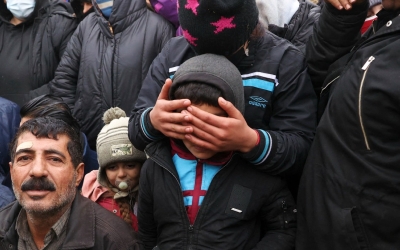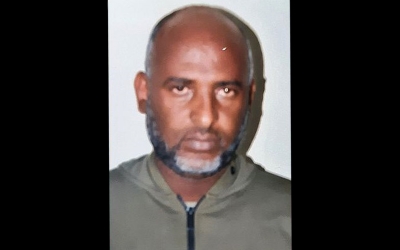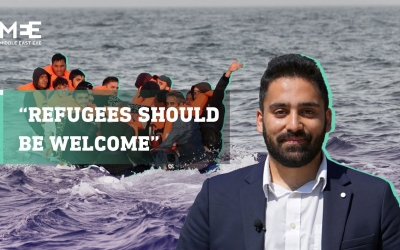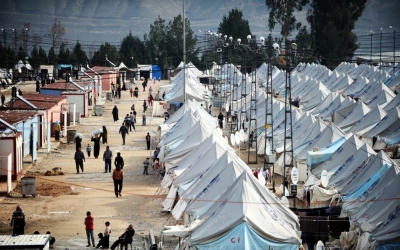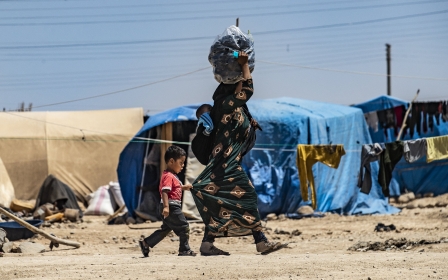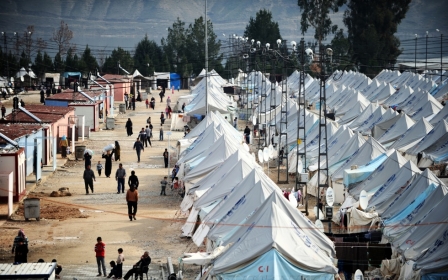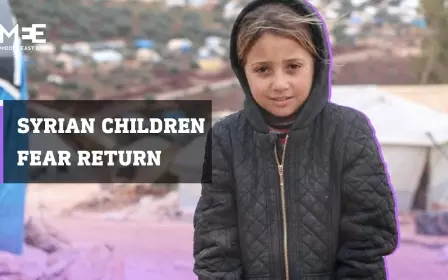From refugee to rescuer, one Syrian woman faces Europe's hostility to migrants
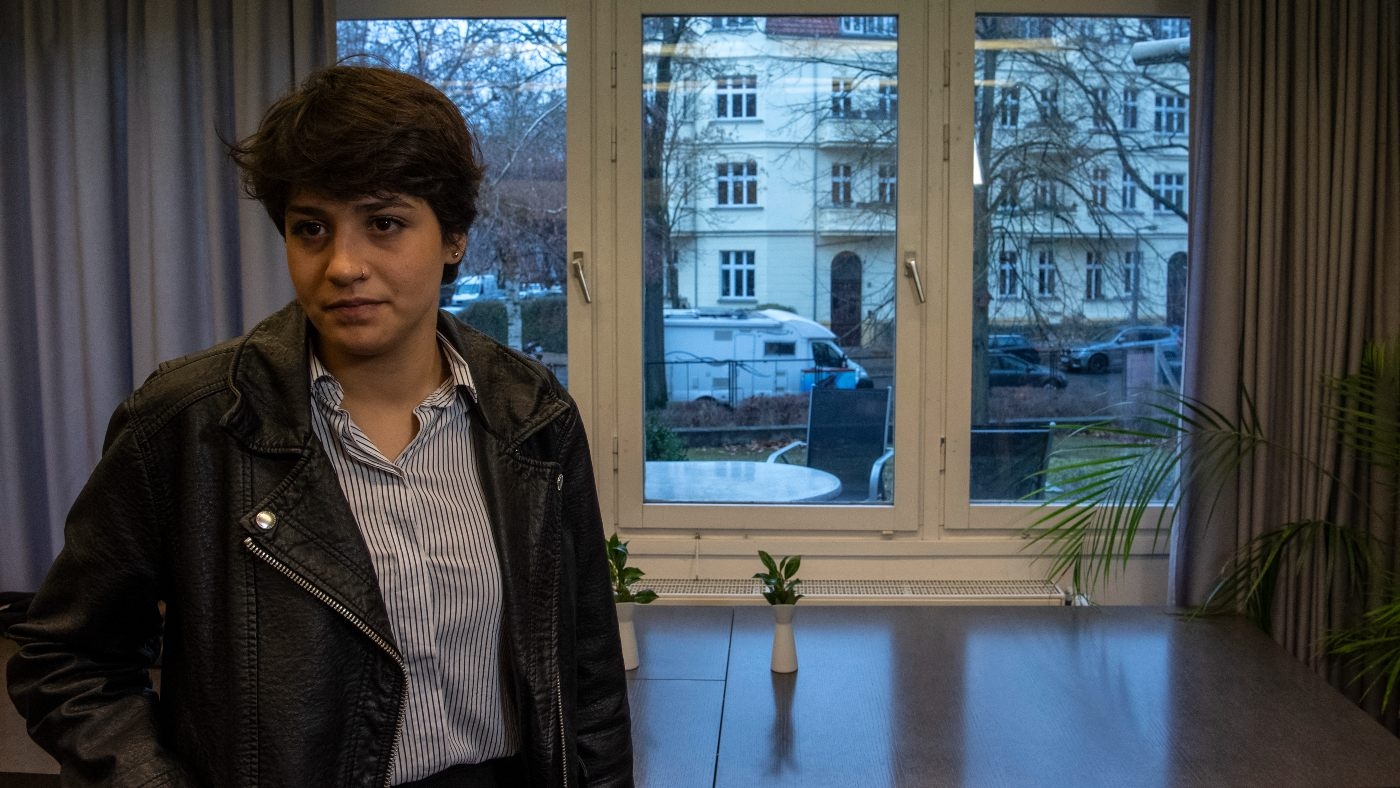
“I survived a civil war, swam across the perilous sea to seek refuge in Europe and managed to stay mentally strong throughout. But the trauma I've experienced after being charged for providing aid to asylum seekers is something I can never forget,” said Sarah Mardini.
At the height of Europe’s refugee crisis in 2015, 26-year-old Mardini and her sister Yusra fled Syria and made international headlines for surviving the treacherous journey.
Being competitive swimmers, the sisters had managed not only to swim across the Aegean Sea between Turkey and Greece, but also rescued other refugees after their inflatable boat gave up on them.
After gaining asylum in Germany, Yusra went on to compete in the 2016 and 2020 Olympic Games. Meanwhile, her older sister was keen to use her skills and continue helping refugees.
Mardini returned to Greece in 2016, where she began volunteering with the Emergency Response Centre International (ERCI), a now-defunct NGO, on the Greek island of Lesbos.
“Greece felt like my second home after Syria. I just loved the warmth of the people in Lesbos and knew everybody there, from the locals to the refugees. So I had to return,” she told Middle East Eye.
Little did she know that her second home would soon consider her a national threat.
Mere months after her sister carried the flag for the Olympic refugee team in the opening ceremony, Mardini is one of 24 humanitarian workers standing trial in Greece this week, accused of facilitating undocumented migration into the EU. If declared guilty, they could face up to eight years in prison.
Mardini is not an isolated case in the European Union, where the refugee crisis has split public and political opinion over whether those helping asylum seekers are heroes or criminals.
‘Not a crime’
In August 2018, Mardini was arrested alongside fellow ERCI volunteer and Irish national Sean Binder. Their humanitarian work led authorities to accuse them of espionage, money laundering and human trafficking - charges carrying up to 25 years in prison in Greece.
“A few months before our arrest, Greek police seemed suspicious about Sarah and me,” Binder, who is currently based in London, told MEE. “They searched our homes and even went through bags of flour in my kitchen, looking for drugs. We were also made to hand over our laptops and phones to them.
“We even read a newspaper article in Greek which said something like 'a German spy' - which is me - 'and his Syrian accomplice were trying to infiltrate a military base to steal state secrets',” said Binder, who is German Vietnamese by birth. He describes the allegations as “completely ridiculous”.
According to Zacharias Kesses, a criminal lawyer in Athens representing Mardini and Binder, Greek police released a statement after their arrest, explaining that they were investigating 30 people believed to be involved in facilitating undocumented migrant crossings into the country.
According to a study published by European research platform ReSoma, the number of people criminalised for humanitarian work grew from 10 in 2015 to 104 in 2018.
“When Greece began dealing with the refugee crisis, the government also began threatening everyone who showed solidarity with asylum seekers,” Kesses said. “But the felony charges against Sean and Sarah are baseless because they were not being paid to rescue refugees – that’s called smuggling. What they did was humanitarian work, and that is not a crime.”
Both Mardini and Binder spent 108 days in pre-detention trial in Greece. Mardini was detained in a cell in Athens - a moment she said she will never forget.
“They now call me a national threat and have banned me from entering Greece... They’ve put my life on hold and I will never forget this,” she said.
‘I’m just Sarah’
Following pressure from several humanitarian watchdog groups, Mardini and Binder were released from pre-trial detention in December 2018, on bail charges worth €5,000 ($5,655).
Then 23, Mardini explains three years later how the pre-detention trial completely “broke her”.
“You know this feeling of having many needles poking your skin? I always feel like I'm being hurt by them constantly. It’s been a really tough and emotional period for me, and even my loved ones are suffering, looking at my pain. I’ve also started experiencing an eating disorder after being charged for doing nothing wrong,” she said.
But she has not let her trauma shape her current life in Germany. “In Berlin, I’m just Sarah. I’m not a refugee, humanitarian aid worker or prisoner. I’m just a simple girl who gets excited from the simple pleasures in life,” she said.
Mardini said growing up in the Middle East toughened her up to face any challenge.
“Being a girl in the Middle East is tough. The second you’re born, you lose everything, and it’s like you had more freedom in your mother’s womb. Coming to Europe gave me hope, and despite going through this trial, I promised myself that I would live my life to the fullest and not worry about the problems of tomorrow.”
At the time of her arrest, Mardini was set to study at a university in Berlin, but her experience in prison made her reconsider her choices.
“I realised I’m still so young. I have so many dreams, and love fashion. If my charges are dropped, that is something I want to pursue,” she said. “But I won’t stop standing up for the causes I believe in and supporting people in need.”
The Mardini sisters’ tale has inspired many people around the world, and has even caught the attention of movie director Stephen Daldry, who has produced a Netflix documentary on their lives. It is due to be released early next year.
Mardini hopes the documentary will empower many young girls around the world.
“This is not just a story about me and my sister. It’s about a whole generation of refugees. It breaks stereotypes about two typical girls from the Middle East,” she said.
Trial from afar
Greek authorities are due to hear Mardini and Binder’s cases on Thursday 18 November. But Mardini will be unable to represent herself at the trial because of an order banning her from entering the country.
“We asked the Greek authorities to permit Sarah’s travel so that she could attend the hearing, but received a negative reply,” said Kesses, who will now be representing her at the trial.
The Lesbos prosecutors could not be reached for a comment. However, Amnesty International’s Giorgos Kosmopoulos will be present in the courtroom to observe the hearing.
“We find it extraordinary that Sarah is not allowed to be present here on trial," Kosmopoulos told MEE. "We’ve reached out to the Greek authorities to understand why they even arrested her in the first place, and hope that the judges will make a fair decision.
“As far as we are concerned, this trial should have never happened,” he added. "The anti-refugee narrative is very strong in Europe, but humanitarian work should not be criminalised. It’s a sad reality we’re currently facing and it needs to be rectified.”
Mardini offers a similar sentiment.
“There are so many people who come from anti-refugee families and if they volunteer and help people in need, they get abused when they go back home. I have a friend whose fiance broke up with her because she went to volunteer as a humanitarian aid worker. This needs to stop and we should be protected under European law,” she said.
This week, many solidarity rallies took place in Brussels and Greece, demanding that charges against humanitarian workers be dropped.
While Binder is in Lesbos for the trial, Mardini hopes for the best as she sits and waits in Berlin.
“I hope the judge looks at me like a human being and pardons me. I’m no hero. All I did was help people. But I’m now just someone who is too strong for this world and ready to accept anything life throws at me,” she said.
Middle East Eye propose une couverture et une analyse indépendantes et incomparables du Moyen-Orient, de l’Afrique du Nord et d’autres régions du monde. Pour en savoir plus sur la reprise de ce contenu et les frais qui s’appliquent, veuillez remplir ce formulaire [en anglais]. Pour en savoir plus sur MEE, cliquez ici [en anglais].


